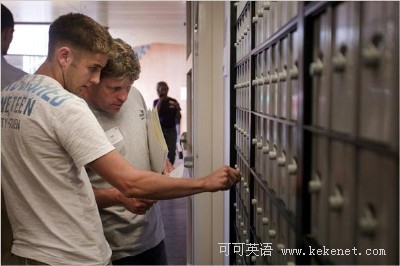
Grinnell College here, like others, has found it necessary to be explicit about when parents really, truly must say goodbye. After computer printers and duffle bags had been carried to dorm rooms, everyone gathered in the gymnasium, students on one side of the bleachers, parents on the other. Shortly after, mothers and fathers were urged to leave campus.
格林內(nèi)爾學(xué)院認(rèn)為,當(dāng)家長來送新生的時候,學(xué)校應(yīng)該明確告訴家長什么時候該與孩子說再見。當(dāng)學(xué)生辦完報到手續(xù)、行李搬至宿舍之后,就在體育館舉行了新生開學(xué)典禮。學(xué)生坐在露天看臺的一側(cè),而父母們則坐在另一側(cè)。而此后不久,學(xué)校也明確要求家長——離開校園。
Moving their students in usually takes a few hours. Moving on? Most deans can tell stories of parents who lingered around campus for days. At Colgate University, a mother and father once went to their daughter’s classes on the first day of the semester and trouped to the registrar’s office to change her schedule, recalled Beverly Low, the dean of first-year students.
讓新生搬進(jìn)宿舍通常只需要幾個小時的時間,但讓父母離開校園需要更長時間。家長們會在校園里逗留數(shù)天。大多數(shù)學(xué)院院長都能講出這些見聞。科爾蓋特大學(xué)負(fù)責(zé)一年級學(xué)生的教務(wù)長貝弗利回憶道,曾經(jīng)有一對父母在新生入學(xué)第一天前往女兒的教室,還到注冊辦公室要求修改女兒的課程表。
A more common approach is for colleges to introduce blunt language into drop-off schedules specifying the hour for last hugs. As of 5:30 p.m. on Sept. 11, for example, the parents of Princeton freshmen learn from the move-in schedule, “subsequent orientation events are intended for students only.”
很多學(xué)校更是明確地使用直言不諱的詞語,告訴父母與孩子分別的具體時間。比如,普林斯頓大學(xué)在今年的迎新手冊上明確規(guī)定,截止到9月11日下午5點30分,“此后的迎新活動都只對學(xué)生開放”。













